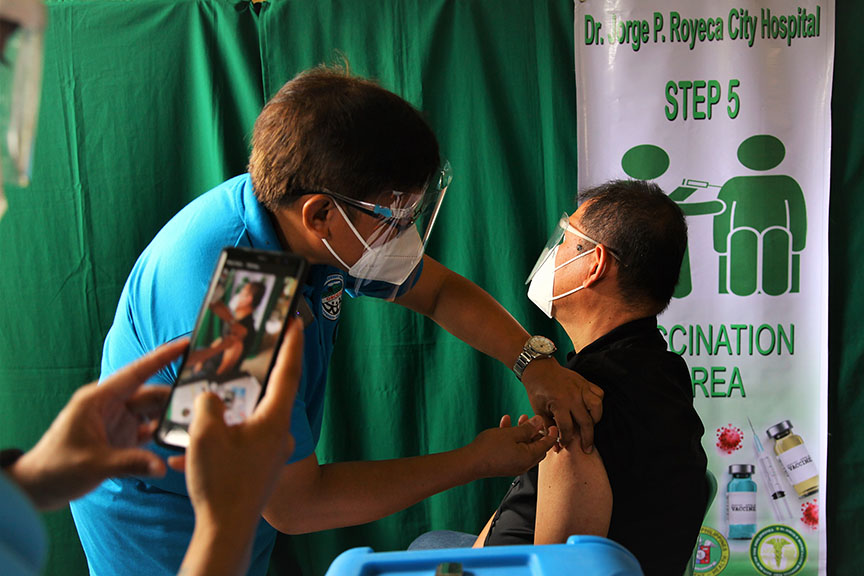GENERAL SANTOS CITY (MindaNews / 8 Sep) – It is better to assume that the dreaded COVID-19 Delta variant is already in the city than it is not, remarked an official of the local chapter of the Philippine Medical Association (PMA).
 COVID-19 cases in General Santos City are rising despite the General Community Quarantine and intensified vaccination rollout. MindaNews file photo by ROMMEL G. REBOLLIDO
COVID-19 cases in General Santos City are rising despite the General Community Quarantine and intensified vaccination rollout. MindaNews file photo by ROMMEL G. REBOLLIDO
This as officials in the city are reportedly mulling a possible shift back to a stricter status than the current General Community Quarantine (GCQ) in the city, which worries many small business owners and low income earners whose businesses and employment status suffered in the past.
In an online IATF emergency meeting over the weekend, Dr. Butch Peñamante, president of the PMA General Santos chapter, noted a rise in the number of infections in the city despite the current GCQ classification and an intensified vaccination rollout.
Peñamante noted that since two months ago, the positivity rate of the city now stands at 35 percent, higher compared to Metro Manila and other areas in Luzon and the Visayas.
Peñamante explained that for every 100 swab samples taken from residents of this city, 35 of them turn out to be COVID-19 positive.
City Mayor Ronnel Rivera appears in agreement with Peñamante, saying the city’s COVID-19 situation is at a “critical level,” with the continued rise in average daily attack rate and positivity rate.
He said despite the GCQ status of the city since June “padayong taas ang ihap sa mga residenteng na-igo sa coronavirus.”
On September 7, local authorities reported 1,033 active cases of COVID-19 in the city after logging in more than 100 new cases for the third time in five days.
Peñamante said this shows that there is failure on the part of the public and the local government in the strict implementation of minimum health standards as a way to avoid infections.
“Nagpapakita lamang ito na kulang ang effort ng mamamayan, kulang ang effort ng LGU, kulang ang effort nating lahat,” Peñamante said.
During the IATF meeting, it was presented that the current COVID-19 occupancy rate is at 90.7 percent and occupied intensive care unit (ICU) beds are 85.71 percent in the six major hospitals in the city. Four of these hospitals declared 100 percent in full capacity.
Dr. Ryan Aplicador, head of the city government-run Dr. Jorge P. Royeca Hospital, said their COVID-19 facility is already filled to capacity.
GenSan Chamber president Elmer Catulpos, who attended the IATF meeting, said it is always good for our city officials to be proactive with the current situation, but they must always strike a good balance in implementing health and safety measures without disrupting businesses and employment.
“Our city already does not have enough resources, mangutang na man gani. How can they support now residents who will lose their livelihood and employment and nowhere else to run to in the event of strict quarantine status?” he said
They have the money however to pay think tanks who can come up with ways on how health and safety is assured at the same time allow shops and business to continue, Catulpos said.
The city government of General Santos is bent on borrowing P1.9 billion bank loan, part of which to defray unpaid bills in COVID-19 expenses incurred last year like food and hotel accommodations of inbound residents who were required to quarantine as well as “ayuda” expenses on rice and canned goods.
Many of these expenses were reportedly flagged by the Commission on Audit (COA) as reported by local media who were able to acquire copies of the COA report.
City councilor Franklin Gacal, who was ousted as chair of the City Council finance committee during his trip to the United States last month, said something is fishy and he will look deep into the matter in aid of legislation. (Rommel G. Rebollido / MindaNews)
